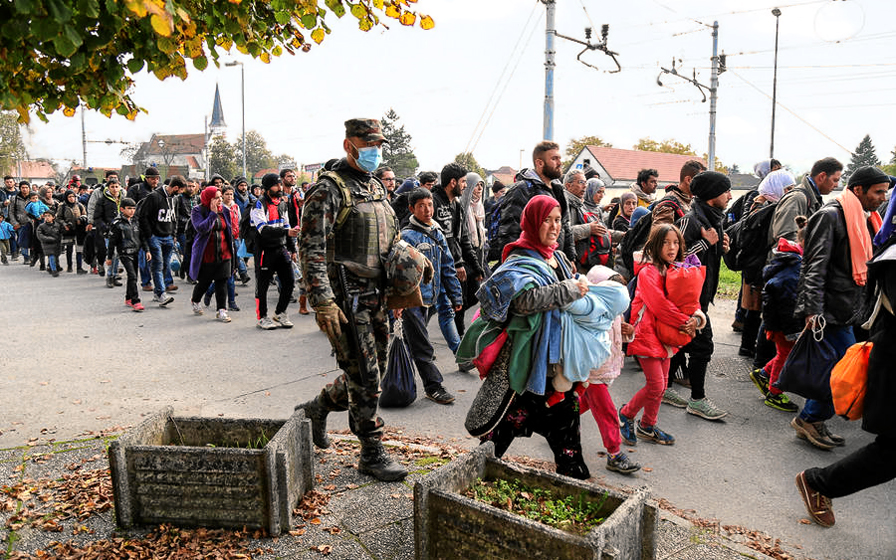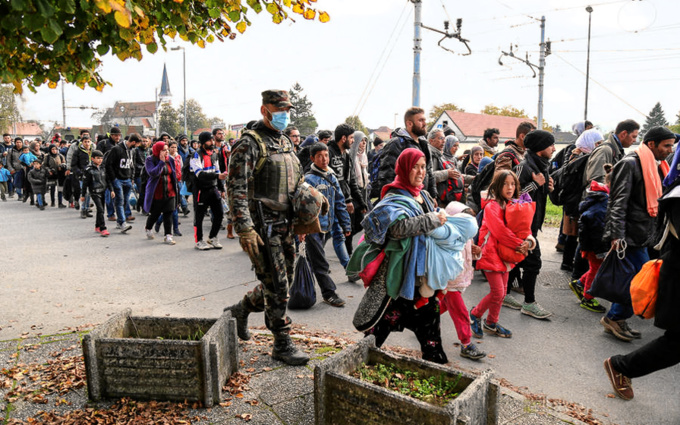According to report of the Federal Statistical Office of Germany (Destatis), the birth rate in Germany in 2015 amounted to an average of 1.5 children per woman. This is the highest level since 1982 (when it stood at 1.51 children per woman). In 2014, the fertility rate was 1.47 children per woman. According to Destatis, the birth rate has constantly been growing since 2011.
The surge is associated primarily with the influx of migrants into the country. In the past year, birth rates among women with German citizenship has increased from 1.42 children to 1.43. Those women who live in Germany and do not have German citizenship, gave birth to an average of 1.86 to 1.95 children per woman. Recall that more than 800 thousand migrants arrived in the country only in 2015.
No other country in the world had such a long period, when the birth rate was below 1.5 children per woman. In Germany, however, it had persisted since the mid-1970s. Now, however, the rate there is higher than in many Mediterranean countries such as Greece, Italy and Spain, yet still is quite low compared to level required for population replacement (2.1 children per woman). Scientists predict that the country's population by 2060 will drop to 68-73 million from the current 81 million.
Destatis takes into account women aged 15 to 49 years. According to the bureau, average age of women giving birth for the first child is 29 years and 7 months, the second - 32, the third - 33 years.
In the XVIII and XIX centuries, the world was inhabited by Europeans. Now, the world is inhabiting Europe. The million-something boom in number of refugees, who arrived in 2015 in Germany, shows that modern demographic trends have changed dramatically. The current immigration crisis is driven by wars in the Middle East. Long before, however, there were more powerful incentives to move to Europe. More even, the problem is going to persist after the Syrian war is over.
Europe is a rich yet aging continent which population is not growing. In contrast, inhabitants of Africa, the Middle East and South Asia are younger, poorer, and are multiplying rapidly. At the height of the imperial era in 1900, European countries accounted for about 25% of the world population. Today, the EU is home for 500 million people, which is about 7% of the world's population. There are more than a billion people In Africa today, and the UN estimates that the number will grow to nearly 2.5 billion by 2050.
Over the past 40 years, countries such as Britain, France and the Netherlands have become much more multinational. Those governments that promised to limit immigration, are finding it increasingly difficult.
EU has its own position on this issue. Refugees can apply for asylum in Europe, yet illegal "economic migrants" have to go back home. Such a policy is unlikely to stop migration flows, and there are several reasons.
Firstly, the number of countries suffering from war or from the incapacity of the government could further increase. Secondly, most of those" economic migrants" do not actually leave Europe. Only 30% those who have been denied asylum were deported or voluntarily left Germany.
Third, when a country hosts a large group of immigrants, it provides continued inflow of people arriving to reunite with family. Therefore, Europe will remain an attractive and reachable destination for poor and ambitious people from all over the world.
Europeans are thoroughly confused about how to respond to these new challenges. In the era of imperialism, immigrants justified colonization of foreign lands with assertive statements about benefits of civilization, which they carried in the backward part of the world.
However, in the post-imperial Europe is afraid to talk about superiority of its culture. Faith in its civilizing mission and the Bible has been replaced by universal values, human rights and international treaties. It is extremely important to decide if European liberal values will be able to withstand pressure of the mass immigration. The struggle between liberals and nativists begins to shape policies of states.
source: ft.com, theguardian.com
The surge is associated primarily with the influx of migrants into the country. In the past year, birth rates among women with German citizenship has increased from 1.42 children to 1.43. Those women who live in Germany and do not have German citizenship, gave birth to an average of 1.86 to 1.95 children per woman. Recall that more than 800 thousand migrants arrived in the country only in 2015.
No other country in the world had such a long period, when the birth rate was below 1.5 children per woman. In Germany, however, it had persisted since the mid-1970s. Now, however, the rate there is higher than in many Mediterranean countries such as Greece, Italy and Spain, yet still is quite low compared to level required for population replacement (2.1 children per woman). Scientists predict that the country's population by 2060 will drop to 68-73 million from the current 81 million.
Destatis takes into account women aged 15 to 49 years. According to the bureau, average age of women giving birth for the first child is 29 years and 7 months, the second - 32, the third - 33 years.
In the XVIII and XIX centuries, the world was inhabited by Europeans. Now, the world is inhabiting Europe. The million-something boom in number of refugees, who arrived in 2015 in Germany, shows that modern demographic trends have changed dramatically. The current immigration crisis is driven by wars in the Middle East. Long before, however, there were more powerful incentives to move to Europe. More even, the problem is going to persist after the Syrian war is over.
Europe is a rich yet aging continent which population is not growing. In contrast, inhabitants of Africa, the Middle East and South Asia are younger, poorer, and are multiplying rapidly. At the height of the imperial era in 1900, European countries accounted for about 25% of the world population. Today, the EU is home for 500 million people, which is about 7% of the world's population. There are more than a billion people In Africa today, and the UN estimates that the number will grow to nearly 2.5 billion by 2050.
Over the past 40 years, countries such as Britain, France and the Netherlands have become much more multinational. Those governments that promised to limit immigration, are finding it increasingly difficult.
EU has its own position on this issue. Refugees can apply for asylum in Europe, yet illegal "economic migrants" have to go back home. Such a policy is unlikely to stop migration flows, and there are several reasons.
Firstly, the number of countries suffering from war or from the incapacity of the government could further increase. Secondly, most of those" economic migrants" do not actually leave Europe. Only 30% those who have been denied asylum were deported or voluntarily left Germany.
Third, when a country hosts a large group of immigrants, it provides continued inflow of people arriving to reunite with family. Therefore, Europe will remain an attractive and reachable destination for poor and ambitious people from all over the world.
Europeans are thoroughly confused about how to respond to these new challenges. In the era of imperialism, immigrants justified colonization of foreign lands with assertive statements about benefits of civilization, which they carried in the backward part of the world.
However, in the post-imperial Europe is afraid to talk about superiority of its culture. Faith in its civilizing mission and the Bible has been replaced by universal values, human rights and international treaties. It is extremely important to decide if European liberal values will be able to withstand pressure of the mass immigration. The struggle between liberals and nativists begins to shape policies of states.
source: ft.com, theguardian.com



















